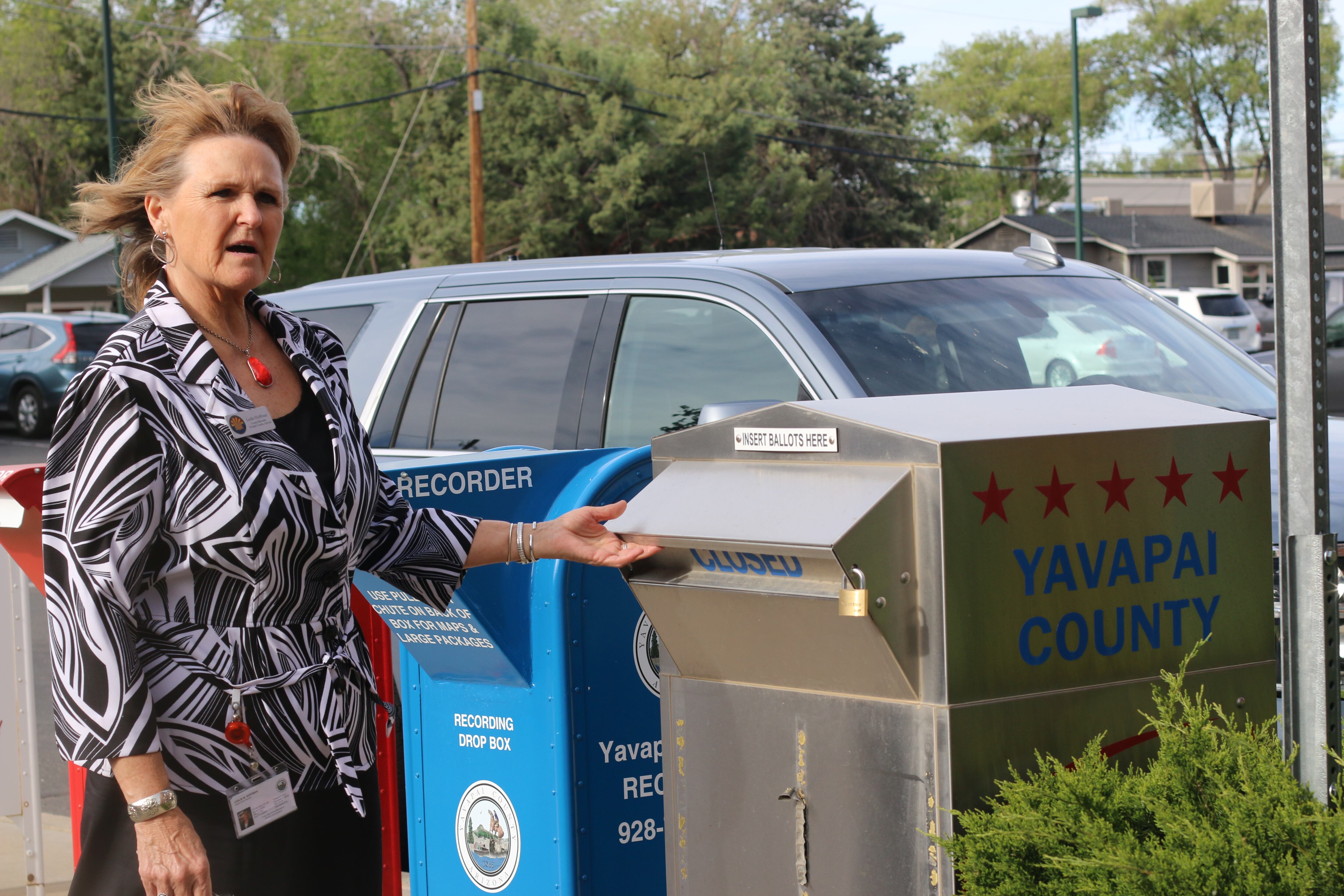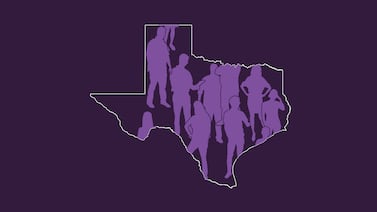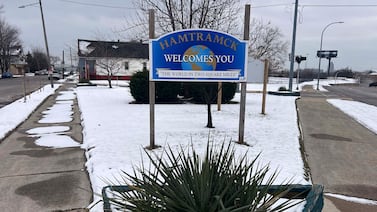During elections, the historic Main Street of this small town in Central Arizona’s high desert gets busy.
A ballot drop box attracts droves of voters to the street, which has the town hall, a barber shop, tattoo parlor, gun store, and gift shop.
Voters cast nearly 2,000 ballots in Dewey-Humboldt’s drop box during the November 2020 election — quite a few for a town of just 3,000 registered voters.
Ballot drop boxes are popular not just here but all across Yavapai County, a Republican stronghold about an hour north of Phoenix that includes Prescott and overwhelmingly voted for Donald Trump in November 2020.
More than half of the county’s voters used a drop box to cast their ballots in that election. That’s much higher than in Maricopa County, the only county that had more drop boxes, where roughly 34% of voters used them.
County officials say that their voters, of all political affiliations, have come to love the drop boxes for their convenience — they’re spread out across the county and open at all hours during the month of early voting. Republican County Supervisor Harry Oberg says he and his wife use them purely for convenience.
“We have talked to members of both parties and they have said, ‘No, they really aren’t thinking about decreasing the number of drop boxes, are they?’” said Angie Cloutier, the county’s elections manager. “And, you know, they are just as upset as we are about the possibility of us removing services from them that we are proud to provide.”
But KC Comstock, the owner of the Main Street Barber Shop, which has a Trump 2024 flag flying outside, says he believes that the drop boxes open up chances for fraud, and voting should be in person with an ID.
Ballot drop boxes have become the far right’s latest cause célèbre, the focus of unfounded allegations of widespread election fraud. The claim is that the boxes allowed and encouraged so-called “ballot harvesting,” or collecting and casting ballots on behalf of others, in the November 2020 election. That practice is illegal in Arizona and some other states. There is no proof that widespread “ballot harvesting” took place in the 2020 election.
A documentary released last month called “2000 Mules,” directed by conservative commentator Dinesh D’Souza — who was pardoned by Trump in 2018 after pleading guilty to violating federal campaign finance law — is bringing a fresh rush of attention. The movie claims that 2,000 ballot harvesters, which the film calls “mules,” illegally deposited ballots into drop boxes during the November 2020 election, and 202 of them were in Maricopa County.
The claims — which have been debunked by multiple news outlets — have kept efforts alive at the state Capitol to ban the boxes, or have them monitored at all times. A bill to do so failed in late May, but the idea lives on.
Republican state lawmakers hosted representatives of True the Vote, the conservative organization behind “2000 Mules,” at a public meeting this week. The filmmakers offered no hard evidence of fraud, but several lawmakers nonetheless said they were still committed to banning the use of the boxes.
State Rep. Shawnna Bolick, who is running for the Republican nomination for secretary of state, said at the meeting she wants to ban the boxes or add real-time surveillance to them “because we want to make sure we have a constitutional republic at the end of the day, and I feel like right now we don’t have one.”
State Rep. Quang Nguyen, a Republican who represents much of Yavapai County, said that the “2000 Mules” movie “sort of opened my eyes up and confirmed things that I had suspected.”
“I just would like to see people cuffed,” Nguyen said.
The ongoing debate means, at least in Yavapai County, that election officials’ plans for how to best use drop boxes this year and in future years are at a standstill. County Recorder Leslie Hoffman, a Republican, said the county has been adding more drop boxes and video surveillance to the boxes in recent years, and was planning to add more cameras for the upcoming elections.
Hoffman said she is confident that the county’s drop boxes are a safe and secure way to vote, but the county can “always increase security. There’s nothing wrong with that.”
But before spending any more money, Hoffman said, the county is waiting to see what lawmakers will do.
Ballot Harvesting Convictions Rare
Collecting ballots for others isn’t illegal under federal law, but some states, including Arizona, ban it in most circumstances.
Arizona’s “ballot harvesting” law, enacted in 2016 and upheld by the Supreme Court in 2021, allows voters to cast ballots only for themselves, their family members, household members, and on behalf of people they care for.
It’s a hard law to enforce in a state that broadly allows for voting by mail. Anyone could easily put others’ ballots in their mailbox, or in a post office box, without detection — and potentially without knowing they were violating the law.
And ballot harvesting charges and convictions have been rare. Arizona Attorney General Mark Brnovich, a Republican, recently indicted two Yuma County Democrats for turning in others’ ballots at a polling place on the day of the primary election in 2020 — cases unrelated to the claims made in “2000 Mules,” which focused on the general election. The Yuma cases are ongoing.
Opponents of drop boxes say that criminals may be less likely to cast others’ ballots for them through the mail, compared to at a drop box, because illegal activity in the mail amounts to federal mail fraud.
Jonathan Diaz, senior legal counsel for voting rights at the nonpartisan Campaign Legal Center, said that it while could be true that breaking Arizona’s “ballot harvesting” law by sending others’ ballots in the mail would amount to federal mail fraud, he does not believe that is part of the calculus when someone is deciding whether to cast ballots in the mail or use a drop box.
More importantly, Diaz said, “the idea that ballot drop boxes facilitate voter fraud, more than voting by mail or voting in person, is absurd.”
“There is no evidence to suggest that using ballot drop boxes that are secure, maintained by county election officials, and used by red and blue states encourage fraud,” he said.
The bill that nearly passed in the state Legislature would have required drop boxes to be monitored, by a human or camera, whenever open.
Hoffman said that if lawmakers require the county’s 19 boxes to be monitored by people who are physically present, the county would need a bipartisan team, which would be costly and cumbersome to staff. The county could put cameras at all locations but might have to eliminate locations if those in charge of the locations won’t agree to it.
When the bill came up for a final vote on May 23, state Sen. Michelle Ugenti-Rita, a Republican, proposed an amendment that would have eliminated drop boxes entirely. She said at the time that doing so would go “a long way in reducing the opportunity for people to ballot harvest.” Republican State Sen. Sonny Borrelli followed that by saying that the boxes were a “disaster waiting to happen.”
Ugenti-Rita’s proposal failed and she subsequently voted against the underlying bill. One other Republican, state Sen. Paul Boyer, who has single-handedly blocked many election-related bills this year, also voted no.
Conservative lawmakers are intent on finding a way to pass a version of the failed measure. But Yavapai shows the public support for drop boxes, at least in one of Arizona’s most Republican counties, doesn’t seem to mirror the lawmakers’ worry.
Convenience of Drop Boxes Appreciated
Yavapai County’s election officials say they have been getting calls and emails from voters asking whether the drop boxes are secure, but they have been hearing far more worry from voters who don’t want to lose them.
The county uses drop boxes more heavily than other areas of the state.
For the November 2020 election, there were at least 117 drop boxes in 10 counties statewide, according to research by the Arizona Association of Counties. Maricopa County, with 2.6 million registered voters, had 38 of them. Yavapai County, with 165,000 registered voters, had the second-highest number, with 19.
Yavapai has been using drop boxes for two decades, and their use has increased over time. Their popularity skyrocketed in 2020, when two-thirds of early voters used them, compared to 2018, when one-third did.
Hoffman and other county election officials suspect that Trump’s oft-repeated warnings about the untrustworthy potential of voting by mail, along with the convenience of the drop boxes, drove more voters — especially Republicans — to use them.
Ken Bennett, a former Arizona secretary of state who is running for the state Senate in Prescott to replace Senate President Karen Fann, said he prefers using a drop box over putting his ballot in the mail.
Any mail sent via the U.S. Postal Service in Prescott first goes to Phoenix to be sorted, even if it’s going somewhere locally in Prescott.
“I just don’t want my ballot mixed in with millions of pieces of mail going all over the country,” Bennett said.
But he and Oberg, the county supervisor who is also a drop box user, both say they are now concerned with the security of drop boxes after watching “2000 Mules.”
Bennett said he does not believe that there was enough in the movie to convict anyone of ballot harvesting, but he would like an investigation.
Oberg said he believes voters need quick and efficient ways to vote, but “there is a growing concern around here in ensuring we have fair elections” and he wants the county board to discuss requiring video surveillance for all drop boxes in Yavapai County.
Comstock, the barber shop owner, says he has heard about “2000 Mules,” but he hasn’t seen the film yet because he’s waiting for it to hit the big screen in Prescott. The drop box claim is the latest in a list of claims he believes about the 2020 election, including that ballots were cast by dead voters, ineligible voters, and via fraudulently duplicated ballots. Multiple investigations haven’t found proof of any such widespread fraud in the 2020 election.
Comstock said he “believes to his core” that Trump won the election.
“2000 Mules” Has No Video Evidence in Arizona
Video footage of drop boxes is one of the main pieces of evidence True the Vote cites in “2000 Mules” to support its allegations of ballot harvesting.
The organization says it obtained drop box video from five states: Arizona, Georgia, Michigan, Pennsylvania, and Wisconsin.
That, coupled with cell phone signal data, underlies its claims about what it calls “mules.” The organization says it tracked individuals’ movements in the states using cell phone data in the time leading up to, during, and after the 2020 general election.
If a cell phone signal traveled near a drop box at least 10 times, and near certain nonprofits thought to be involved in ballot trafficking five times, the organization marked that person as a potential “mule.” It then said it narrowed its list of “mules” further by making sure that route the person was taking was different from the route before or after the election, and by looking more closely at the person’s path to and from the locations using multiple data points.
Gregg Phillips, a True the Vote representative, said at the meeting with state lawmakers this week that the process was precise enough to exclude false positives.
Yet he and Catherine Engelbrecht, True the Vote’s founder, did not expand on the exact evidence behind their calculation of 202 “mules” in Maricopa County. Questions that Votebeat sent to the organization in advance of the meeting were not answered, and the organization declined an interview in person.
They declined to name the nonprofits they studied. They did not clarify exactly how close the “mules” had to come to the ballot boxes in order for them to be deemed to have dropped off a ballot, a key question since many ballot boxes in the state are at popular locations that people make quick, frequent visits to, such as city and town halls and libraries.
And, perhaps most importantly, they said that they had no usable video footage from Arizona to match with the cell phone data so they could see the “mules” in action.
Maricopa County had video surveillance on the drop boxes outside of its two election offices in Phoenix and Mesa. A different county agency controlled the Mesa footage, so the Elections Department said it did not provide video for that location in response to True the Vote’s records request. For the Phoenix location, the department provided video from three camera angles, including nearly 1,400 hours of footage, said Megan Gilbertson, a spokesperson for the county elections department.
True the Vote representatives said at the meeting that the footage Maricopa County provided the organization was unusable because of a tent that was positioned near the drop box, partially blocking the view. That tent was set up because the county staffed the drop box to help with traffic flow, Gilbertson said.
In response to the claim that the county’s drop boxes allowed for election fraud, Gilbertson said that county officials have “conclusively demonstrated that Maricopa County administered the election with integrity and the results were accurate and reliable.”
“The 2020 election is over,” she said. “We continue to stand by the integrity of our workers and the effective checks and balances in place that allow us to provide free, fair, and accurate elections.”
Even if the organization identified people who were dropping off multiple ballots, that doesn’t mean that the ballots, or the votes cast on them, were somehow fraudulent, or cast by ineligible voters. And there would be no way for the organization to tell whether the ballots contained votes for Trump or Biden. That leaves one of the broadest claims in the movie — that the patterns they identified suggested enough fraudulent votes had been cast to call Biden’s win into question — without merit.
Pressed by Nguyen on whether True the Vote has given its findings to law enforcement, Phillips said that there is a disagreement between True the Vote and Attorney General Brnovich’s office on whether that happened.
He at first said that he would soon make sure Brnovich had a copy of the data. Then, he said that he had already given it to “contacts at the FBI” and needed to check with them to determine whether his organization can also give it to Brnovich’s office.
State Sen. Kelly Townsend said after the meeting that it was disappointing to hear True the Vote did not have usable video footage in the state. That, she said, will make it harder to convict the “mules” of ballot harvesting.
But she also said she still believes the drop boxes should be banned, and she said she plans to try to find a way to make it happen this year, perhaps as a measure attached to an appropriation in the budget.
County Says Drop Boxes Are Secure, Wants More Cameras
Almost all of Yavapai County’s drop boxes are outdoor, drive-up locations.
The county was one of several to get new drop boxes from the secretary of state’s office for the 2020 election. The state got the money from federal COVID-19 relief funds, spending about $178,000 on buying and installing 85 boxes across the state.
Hoffman said the county takes integrity and security of the drop boxes seriously. They place them in high-traffic and visible locations. They only open the boxes during the election to collect ballots if a bipartisan team is present. They show voters how small the drop box slot is, so only ballots can fit through, and show them how the boxes are cemented to the ground and as indestructible as they can make them.
Nine drop boxes in the county are already monitored by video. Hoffman said the county wants to add video surveillance to more drop boxes, and has the money to do it. They just want to wait to see what state lawmakers decide before they move forward.
Hoffman, a lifelong Republican whom voters have elected as recorder three times, gets frustrated with the accusations of widespread election fraud. She said county officials work hard to convince people who call them that their processes are secure. They give voter tours and spend time carefully crafting email responses to concerns. But she and other county officials say they realize there is a small and loud minority they won’t be able to convince.
“The exact word going around is that I’m garbage,” Hoffman said. “Because I’m not going to mold to what they want.”
Oberg said that despite his concerns about the drop boxes, he believes that elections in Yavapai are fair and secure, “for the most part.”
“This is a small community,” he said. “People know each other. I think it’s easier to have a level of confidence here that’s not possible in a bigger city.”




